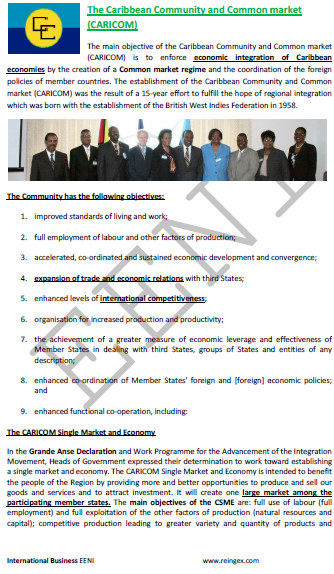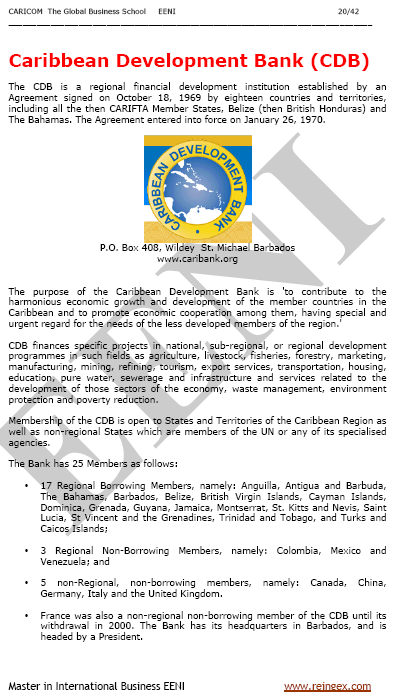CARICOM Caribbean Community. Single Market
Caribbean Community (CARICOM Single Market and Economy). Bahamas, Barbados, Belize, Dominica...

The main objective of the Caribbean Community and Common Market (CARICOM) is to enforce economic integration of Caribbean Economies by the creation of a common market regime and coordination of foreign policies of the member countries.
The Caribbean Community and Common Market Member States are Antigua and Barbuda, the Bahamas, Barbados, Belize, Dominica, Grenada, Guyana, Haiti, Jamaica, Montserrat, Saint Lucia, Saint Kitts and Nevis, Saint Vincent and the Grenadines, Suriname, and Trinidad and Tobago.
- Introduction to CARICOM
- Economic Profile of Caribbean Countries
- Agreement on Free Trade and Economic Integration of the Caribbean Community and Common Market (CARICOM)
- CARICOM Single Market and Economy
- International Trade Policy of the Caribbean Community
- The Caribbean Development Bank
Sample - Caribbean Community and Common Market (CARICOM):


- CARIFORUM-EU Agreement
- Trade Relations with Canada and the United States
- Colombia-CARICOM Agreement
- CARICOM-Costa Rica Agreement
- CARICOM-Dominican Republic Agreement
- Caribbean-Canada Trade Agreement
- UK-CARIFORUM Free Trade and Economic Integration Agreement
- Caribbean Basin Initiative
- The United States-Caribbean Basin Trade Partnership Act (CBTPA)
- Organization of Eastern Caribbean States (OECS)

The educational aims of the Subject “Caribbean Community (CARICOM)” are:
- To understand the purposes and trade policy of CARICOM
- To research the economic profile of the Caribbean Countries
- To evaluate the benefits for CARICOM member countries
- To research the economic integration process (Caribbean Single Market and Economy) and Foreign Trade among the Caribbean Community member countries
- To learn about affiliated institutions:
- Caribbean Development Bank
- Organization of Eastern Caribbean States (OECS)
- To identify CARICOM Trade Agreements

The Subject “Caribbean Community (CARICOM)” is included within the curriculum of the following academic programs at EENI Global Business School:
Masters: International Business, Foreign Trade.


Masters adapted for Caribbean students.
Languages:  or
or  CARICOM
CARICOM  CARICOM.
CARICOM.
- Subject Credits “CARICOM”: 1

- The associate members of CARICOM are Anguilla, Bermuda, British Virgin Islands, Cayman Islands, Turks and Caicos Islands
- The observer states of CARICOM are Aruba, Colombia, Curaçao, Mexico, Puerto Rico, Dominican Republic, Saint Martin and Venezuela
CARICOM Single Market and Economy.
- The CARICOM Single Market and Economy is planned to benefit the population of the Caribbean region by providing more opportunities to produce and trade products and services and to attract Foreign Direct Investment
- The CARICOM Single Market and Economy will create one single market among the participating member economies

The Caribbean Development Bank is a regional financial development institution established in 1969 by an Agreement signed by eighteen countries and territories, including all the ten Caribbean Free Trade Association member economies, Belize (then British Honduras), and the Bahamas.
The Eastern Caribbean Central Bank is the Monetary Authority for the Eastern Caribbean Countries of Anguilla, Antigua and Barbuda, the Commonwealth of Dominica, Grenada, Montserrat, Saint Kitts and Nevis, Saint Lucia, and Saint Vincent and the Grenadines.
CARIFORUM Economic Partnership Agreement with the European Union.
The Economic Partnership Agreement was signed on 2008 by the v: Antigua and Barbuda, Bahamas, Barbados, Belize, Dominica, Grenada, Jamaica, Saint Christopher and Nevis, Saint Lucia, Saint Vincent and the Grenadines, Suriname, Trinidad and Tobago, and Guyana.
Haiti signed on 2009.
CARICOM belongs to Western Civilization (Caribbean Economic Area).
(c) EENI Global Business School (1995-2025)
Top of this page









 WhatsApp
WhatsApp


